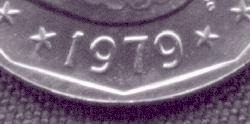
NARROW BORDER VARIETY

WIDE BORDER VARIETY
Anthony Dollar
Die Varieties |
|
|
1979-P Narrow and Wide Border: This highly collectible variety is noted by the distance between the rim and peripheral design elements, most prominently between the date and rim. Because of this, this variety is sometimes refered to as "Far Date" and "Near Date". This is actually inaccurate as the date was not moved, but instead the border was widened. They are also often refered to as "Narrow Rim" and "Wide Rim". The Mint began striking the 1979-P SBA Dollars with the "narrow border". Late in 1979 the border was widened to give the coin a more aesthetic appearance. The "narrow border" variety is found on all 1979 dollars from all of the mints. The 1979 "wide border" variety can only be found on the "P" mint issues. The "wide border" variety was used for the remainder of the series.
The mint did not keep accurate records on how many of each variety were struck. According to information provided by George E. Hunter, the Assistant Director of Technology for the U.S. Mint at the time, there were 643 "wide border" dies used at the Philadelphia Mint in 1979. It is estimated that there are approximately 250,000 strikes per die. Using this estimate the Mint would have produced approximately 160,750,000 1979-P "Wide Border" Susan B. Anthony Dollars, or nearly 45% of all 1979-P Anthony Dollars minted. However, since the Mint has released their entire production of Anthony Dollars, it does not appear that the "Wide Border" variety makes up nearly half of the 1979-P production. While not rare, or even scarce, the "Wide Border" variety is somewhat elusive, especially in high grades (Mint State 66 and above). We may never know exactly how many were struck.
FAQ:
What is the significance of the rim having 11 sides? |
1979-S
Proof Type 1 & 2 Mint Marks
Images
and text of the Proof 1979-S Type 1 & 2 mint marks
are produced |
1981-S
Proof Type 1 & 2 Mint Marks
|
1981-S "Type-1" This is the same Mint mark as introduced in the later part of 1979 for proof coinage production (and referred to as Ty-2 for that year). (It is the first one used in 1981 and is thus designated Ty-1 for that year.) It exhibits smaller rounded serifs and more oval shaped center loops than found on the Ty-2. It may come with or without clear fields or "attachments" within the center loops depending on the amount of punching pressure utilized to sink the image into the die and/or the amount of polishing the die receives. This is the more common variety for the year. |
|
1981-S "Type-2" This Mint mark was introduced in the later part of 1981 for proof coinage production (and referred to as Ty-2 for this year). It exhibits large bulbous serifs and rounder center loops than found on the Ty-1. In spite of the fact that this variety is frequently and inaccurately referred to as "Clear S", it may come with or without clear fields or "attachments" within the center loops depending on the amount of punching pressure utilized to sink the image into the die and/or the amo unt of polishing the die receives. It does, however, have a greater tendency to be found with "clearer fields" within the loops than the Ty-1 but this is not a determining factor of type. |
Images
and text of the Proof 1981-S Type 1 & 2 mint marks
are produced |